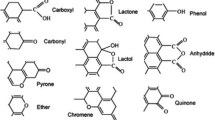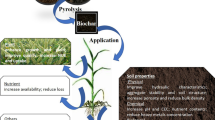Abstract
Complying with the technical specifications of compost production is of high importance not only for environmental protection but also for increasing the productivity and promotion of compost use by farmers in agriculture. This study focuses on the compost quality of the Palestinian market and farmers’ attitudes toward agricultural use of compost. The quality is assessed through selection of 20 compost samples of different suppliers and producers and lab testing for quality parameters, while the farmers’ attitudes to compost use for agriculture are evaluated through survey questionnaire of 321 farmers in the Hebron area. The results showed that the compost in the Palestinian markets is of medium quality due to partial or non-compliance with the quality standards and guidelines. The Palestinian farmers showed a positive attitude since 91.2% of them have the desire to use compost in agriculture. The results also showed that knowledge of difference between compost and chemical fertilizers, perception of compost benefits, and previously experiencing problems in compost use are significant factors affecting the farmers’ attitude toward the use of compost as an organic fertilizer.



Similar content being viewed by others
References
Achiba, W. B., Gabteni, N., Lakhdar, A., Laing, G. D., Verloo, M., Jedidi, N., & Gallali, T. (2009). Effects of 5-year application of municipal solid waste compost on the distribution and mobility of heavy metals in a Tunisian calcareous soil. Agriculture, Ecosystems and Environment, 130, 156–163.
Ali, H., Ali, N., Ahmad, A. R., Ibrahim, M., Ahmad, S., & Yaacob, S. (2012). Solid Waste management and the willingness to pay for improved services towards achieving sustainable living. Advances in Natural and Applied Science, 6(1), 52–60.
Al-Khateeb, A. J., Al-Sari, M. I., Al-Khatib, I. A., & Anayah, F. (2017). Factors affecting the sustainability of solid waste management system—the case of Palestine. Environmental Monitoring and Assessment, 189(2), 93–104.
Al-Khatib, I. A., Monou, M., Abu Zahra, A. F., Shaheen, H. Q., & Kassinos, D. (2010). Solid waste characterization, quantification and management practices in developing countries. A case study: Nablus district – Palestine. Journal of Environmental Management, 91, 1131–1138.
Al-Sari, M. I., Al-Khatib, I., Avraamides, M., & Fatta-Kassinos, D. (2011). A study on the attitudes and behavioural influence of construction waste management in occupied Palestinian territory. Waste Management and Research, 30(2), 122–136.
Barrena, R., Font, X., Gabarrell, X., & Sánchez, A. (2014). Home composting versus industrial composting: influence of composting system on compost quality with focus on compost stability. Waste Management, 34, 1109–1116.
Begum, R. A., Siwar, C., Pereira, J. J., & Jaafar, A. (2006). A Logistic regression analysis of the contractor’s awareness regarding waste management. Journal of Applied Sciences, 6(9), 1904–1908.
Begum, R. A., Siwar, C., Pereira, J. J., & Jaafar, A. (2009). Attitudes and behavioural factors in waste management in the construction industry of Malaysia. Resources, Conservation and Recycling, 53, 321–328.
Bewick, V., Cheek, L., & Ball, J. (2005). Statistics review 14: Logistic regression. Critical Care, 9(1), 112–118.
Colón, J., Martínez-Blanco, J., Gabarrell, X., Artola, A., Sánchez, A., Rieradevall, J., & Font, X. (2010). Environmental assessment of home composting. Resources, Conservation and Recycling, 54, 893–904.
Compost Management Program. (2005). A& L Canada laboratories. Compost analysis for available nutrients and soil suitability criteria and evaluation, report. Website: https://docgo.net/compost-management-compost-analysis-for-available-nutrients-and-soil-suitability-criteria-and-evaluation.
Danso, G., Fialor, S. C., & Drechse, P. (2002). Farmers’ perception and willingness to pay for urban waste compost in Ghana. Waste Management and the Environment, ISBN 1–85312–907-0. Website: http://ir.knust.edu.gh/xmlui/handle/123456789/1938.
Danso, G., Drechse, P., Fialor, S. C., & Giordano, M. (2006). Estimating the demand for municipal waste compost via farmers' willingness-to-pay in Ghana. Waste Management, 26(12), 1400–1409.
Domingo, J. L., & Nadal, M. (2009). Domestic waste composting facilities: a review of human health risks. Environment International, 35, 382–389.
Environmental Quality authority (EQA). (2007).Overview of solid waste management in the Gaza Strip.EQA library, Gaza City, The Gaza strip.
HydroplanIngenieur-GesellschaftmbH, & AEEIC. (2013). Local market potential of organic compost fertilizers in Palestine “feasibility study”, project no. KFW-DEG/ E8122.
IFC (International Finance Cooperation). (2012). Solid waste management in Hebron and Bethlehem governorates, assessment of current situation and analysis of new system. Report, Palestine.
Ittiravivongs, A., (2012). Household waste recycling behavior in Thailand: The role of responsibility. International Conference on Future Environment and Energy IPCBEE, 28(2012).
Jordanian Standard Institution (JSI). (2000). Technical regulation for organic fertilizers, Standard no 962/2000, Amman, Jordan.
Mafarjeh, M. A. (2011). Feasibility of a windrow composting pilot for domestic organic waste recycling in Beit Liqia Village - Palestine. MSc. Thesis, Birzeit University, Palestine.
Ministry of Agriculture (MoA). (2011). Reality and the use of compost in Palestine, general Administration of Soil and Irrigation, the Department of Soil, 2011 (internal report). Ramallah, Palestine.
Mohee, R., Mauthoor, S., Bundhoo, Z. M. A., Somaroo, G., & Gunasee, S. (2015). Current status of solid waste management in small island developing states: a review. Waste Management, 43, 539–549.
Nassar, A. (2015). Potential of solid waste composting in the Gaza Strip-Palestine. Journal of Agriculture and Ecology Research International, 4(1), 18–24.
Nassar, A., Tubail, K., & Afifi, S. (2009). Attitudes of farmers toward sludge use in the Gaza Strip. International Journal of Environmental Technology and Management, 10(1), 89–101.
National Strategy for Solid Waste Management in Palestinian Territory (2010–2014). (2010). Ramallah, Palestine.
Palestinian Central Bureau of Statistics (PCBS). (2017). Main statistical indicators. Ramallah, Palestine.
Palestinian Standards Institution (PSI). (2012). Standard specification for organic fertilizer (compost). PS/-2652, Ramallah, Palestine.
Proietti, P., Calisti, R., Gigliotti, G., Nasini, L., & Marchini, A. (2016). Composting optimization: integrating cost analysis with the physical-chemical properties of materials to be composted. Journal of Cleaner Production, 137, 1086–1099.
Qadomi, N. (2014). Good compost quality. Ramallah: Soil Department, Ministry of Agriculture (MoA).
Sánchez-Monedero, M. A., Cegarra, J., García, D., & Roig, A. (2002). Chemical and structural evolution of humic acids during composting. Biodegradation, 13, 361–371.
SIDA, Swedish International Development Cooperation Agency. (2006). Urban solid waste management. Urban issue paper.
Solutions for Development Consulting. (2009). Feasibility study for construction of compost factory. Palestine.
Somda, J., Nianogo, A. J., Nassa, S., & Sanou, S. (2002). Soil fertility management and socio-economic factors in croplive stocks ystems in Burkina Faso: a case study of compostingtechnology. Ecological Economics, 43, 175–183.
Soobhany, N., Mohee, R., & Garg, V. K. (2015). Recovery of nutrient from municipal solid waste by composting and vermicomposting using earthworm Eudriluseugeniae. Journal of Environmental Chemical Engineering, 3(4, Part A), 2931–2942.
The Waste and Resources Action Programme (WRAP). (2002). Comparison of compost standards within the EU, North America and Australasia. Main Report.
U.S. Environmental Protection Agency (USEPA). (1995). Decision maker’s guide to solid wastemanagement, volume II. Website: http://regulationbodyofknowledge.org/wp-content/uploads/2014/06/EPA_Decision_Makers.pdf.
United Nations Development Program (UNDP). (2015). Provision of services to prepare a Green House Gases (GHG) emission inventory and the mitigation chapters of Palestine’s Initial National Communication Report (INCR).
United States Composting Council. (2001). Field guide to compost use. http://compostingcouncil.org/admin/wp-content/plugins/wppdfupload/pdf/1330/Field_Guide_to_Compost_Use.pdf.
Vázquez, M. A., & Soto, M. (2017). The efficiency of home composting programmes and compost quality. Waste Management, 64, 39–50.
Weber, J., Karczewska, A., Drozd, J., Licznar, M., Licznar, S., Jamroz, E., & Kocowicz, A. (2007). Agricultural and ecological aspects of a sandy soil as affected by the application of municipal solid waste composts. Soil Biology & Biochemistry, 39, 1294–1302.
Wood End Research Laboratory. (2000). Compost quality standards & guidelines. Final Report.
Woods End Research Laboratory. (2005). Interpretation of waste and compost tests. Journal of the Woods End Research Laboratory, 1(4), 1–5.
Acknowledgements
This research is partially supported by the Joint Service Council for Solid Waste Management for Hebron and Bethlehem Governorates (JSC-H& B) through PMSP program that is funded by the General Consulate of Italy.
Author information
Authors and Affiliations
Corresponding author
Rights and permissions
About this article
Cite this article
Al-Sari, M.I., Sarhan, M.A.A. & Al-Khatib, I.A. Assessment of compost quality and usage for agricultural use: a case study of Hebron, Palestine. Environ Monit Assess 190, 223 (2018). https://doi.org/10.1007/s10661-018-6610-x
Received:
Accepted:
Published:
DOI: https://doi.org/10.1007/s10661-018-6610-x




